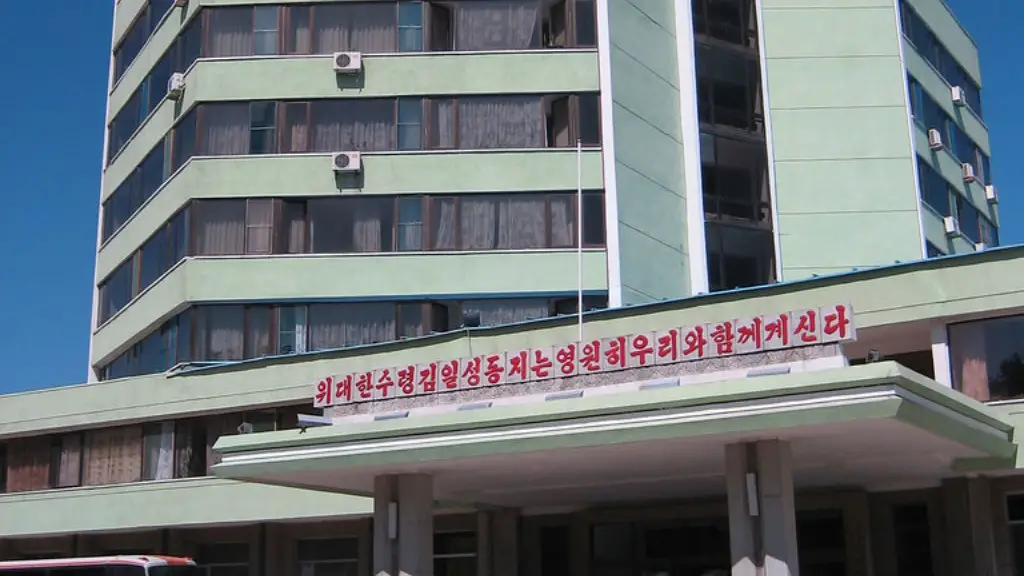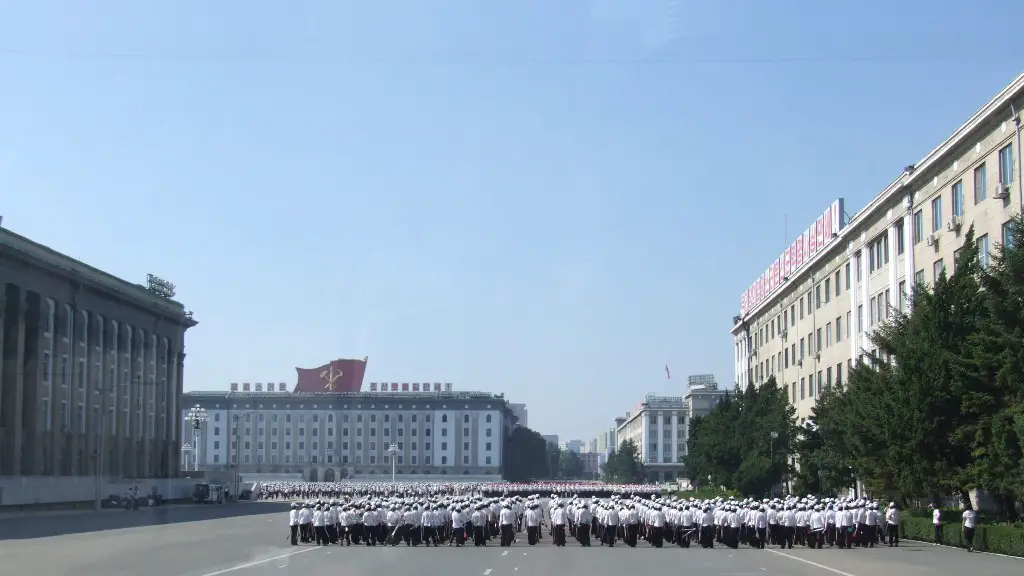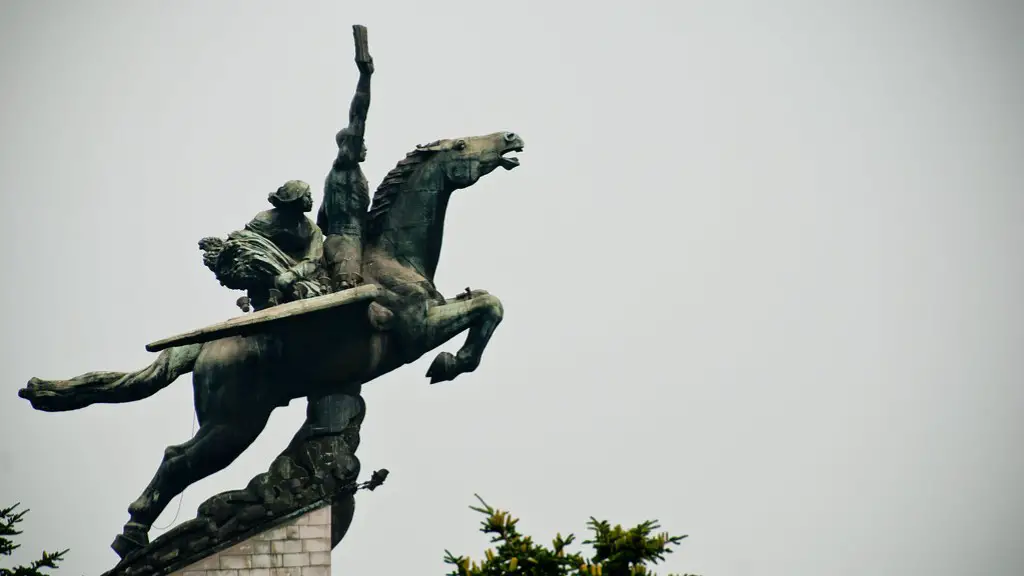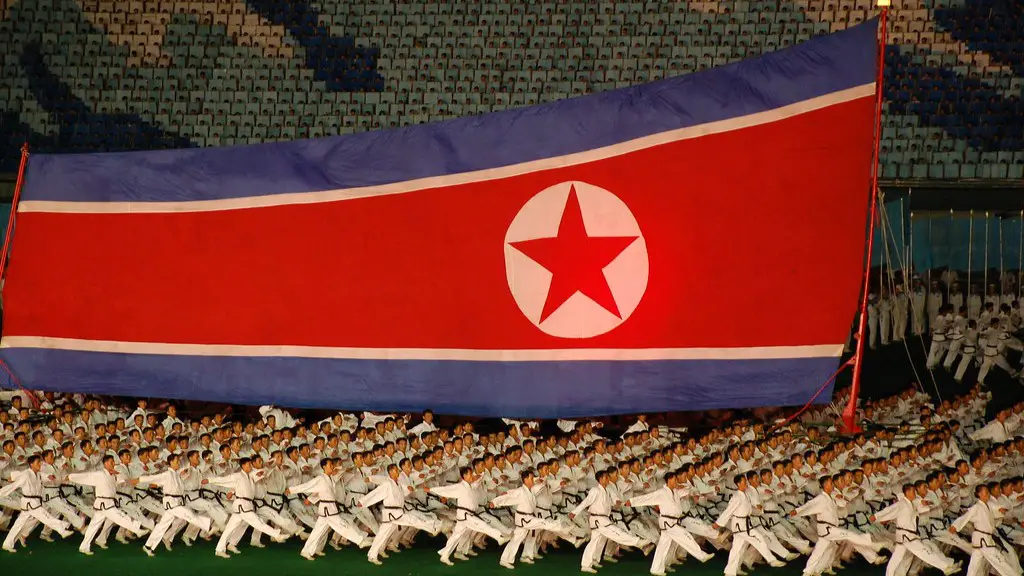North Korea’s journey to becoming a communist country is a long and complicated one, beginning with its traditional isolationism and spanning centuries of invasions, occupations, and civil war. This article will explore the history of North Korea and how it developed into a communist state.
Since its first recorded contact with other nations in the early 7th century AD, North Korea has maintained a very insular policy, where contact with other countries was limited and suspicious. The regime viewed any outside contact or foreign interference as a threat to its independence. As a result, the country had limited economic and social exchanges with the rest of the world.
Fast-forwarding to the 20th century, in 1910 Japanese forces occupied the Korean peninsula, which began a 35-year period of Japanese colonialism. With the end of World War II, Soviet forces temporarily occupied the Northern area of Korea, while the United States occuped the South. In 1948, two separate governments were founded, with the North becoming a communist state under Soviet influence and the South becoming a capitalist capitalist state, under the support and influence of the United States.
The intensification of the Cold War and the ideological competition between the two sides led to the outbreak of the Korean War in 1950. North Korea, with backing from the Soviet Union and China, was pitted against South Korea, supported by the United States, United Kingdom and other nations. The Korean War ended in 1953 with an armistice with neither side gaining an advantage. Despite this, the two nations, North Korea and South Korea, remain in conflict to this day.
Since 1953, North Korea has faced numerous economic and political crises, including famines and international isolation. As a result of its Marxist-Leninist political system, the government has tightly controlled its economy and denied basic rights to its citizens for many years. In 2012, North Korea formally designated itself as a socialist state.
To this day, North Korea is widely considered one of the most oppressive regimes in the world. The North Korean government has little to no transparency and viciously suppresses any form of protesting or dissent. This has led to international condemnation, with many countries—including the United States and the United Nations—imposing sanctions on North Korea in an effort to dissuade them from their nuclear weapon and missile programs.
Although the country continues to face international backlash for its oppressive methods of governance and nuclear weapons program, North Korea has become a powerful example of a communist nation. Unfortunately, it is also one of the most isolated and oppressive countries in the world.
How Has North Korea Sustained Its Political System?
North Korea has actively sustained its political system by continuing to use propaganda and ideological education to engage citizens’ loyalty, allowing the government to maintain a strong hold over the country. As an isolated nation, North Korea receives limited access to outside information and media, so the government has the ability to control what its citizens see and hear. North Korea appears to heavily rely on coercion and fear as primary tools of control, as the nation’s ruling family frequently warns of the risks of attempted uprising or insurrection.
The government also uses its media outlets, like newspapers, magazines, and radio and television broadcasts, to disseminate its own narrative to its citizens. These outlets tend to downplay international criticism and instead focus on the country’s accomplishments or successes. North Korea also holds regular ideological education sessions for its citizens, where people are exhorted to be forever loyal to their leaders, a practice that reinforces an atmosphere of strict ideological loyalty.
What Are the Challenges Faced By The North Korean People?
The North Korean people face many challenges in their daily lives, thanks to the oppressive nature of their government. Most notable among these difficulties is the nation’s limited access to food and basic necessities, due to its economic isolation. North Korea has had a history of food shortages and famines, due to natural disasters as well as the economic sanctions imposed on the nation by the international community.
In addition to the lack of food, the North Korean people must also contend with the country’s own oppressive laws and regulations. Citizens must adhere to strict restrictions on the kinds of activities they can take part in, and the government is known to use harsh punishments for those who disobey its rules. Freedom of speech and the press are heavily curtailed and repression of religious freedom is rampant in the nation.
Furthermore, North Korea’s human rights record is some of the worst in the world. The government has been accused of widespread human rights abuses, with reports of thousands of political prisoners being held in inhumane conditions in the nation’s prison camps. In addition, the country has received criticism from the international community for its policy of restricting citizens from leaving the nation.
What Changes Have Been Made To Increase International Relations With North Korea?
The international community has made several attempts to increase its diplomatic relations with North Korea, usually through back-channel negotiations between its envoys and foreign officials. These attempts are usually aimed at persuading North Korea to abandon its nuclear program and reducing tensions between them and other nations. However, North Korea has so far been resistant to these efforts and has instead continued to expand its nuclear capabilities.
In recent years, there have been several attempts by foreign leaders, such as those of the United States and China, to convince North Korea to moderate its stances. Though North Korea has made some steps toward progress, such as its 2018 Declaration of the Complete Denuclearization of the Korean Peninsula, the nation’s leadership has yet to show any real movement on the issue.
In addition to diplomatic maneuvers, the international community has also utilized economic incentives to try and persuade North Korea to abandon its nuclear program. The United Nations has imposed multiple economic sanctions against North Korea in an effort to dissuade the country from its militaristic course. So far, these efforts have had limited success, but it is still hoped that the economic pressure will eventually lead to positive change from North Korea.
What Tips And Advice Can People Give To Those Visiting North Korea?
Though visiting North Korea is not allowed for citizens of many countries, it is allowable for some individuals, often for academic or business purposes. For those fortunate enough to visit, there are some tips to follow that will make the experience more enjoyable.
The biggest thing to remember is to respect the North Korean culture and the country’s laws. As a visitor, you will likely be closely monitored and should not attempt to leave the approved areas of your tour or speak ill of the nation’s leadership. Furthermore, visitors should also be aware that the people may be wary of foreigners, so it is important to be sensitive and respectful of the culture.
The country’s restrictions are also very rigorous, with citizens having to apply for government permission to travel abroad and with international travelers needing to obtain a visa to enter the country. While tourist itineraries can often be quite structured, tourists should take advantage of limited freedoms they may be allowed, such as buying souvenirs or speaking to locals without being monitored.
What Are The Future Prospects Of North Korea?
Due to North Korea’s totalitarian regime and lack of contact with the outside world, it is difficult to accurately predict the nation’s future prospects. Currently, North Korea is faced with significant international pressure to denuclearize and has yet to adhere to these demands. Furthermore, the nation’s continued human rights abuses and its lack of transparency have elicited concern and criticism from the global community.
On the other hand, a number of countries have recently opened formal diplomatic relations with North Korea and have been in negotiations with the country to possibly relax sanctions. This is in addition to the nation’s recent initiatives to improve its relations with other nations, such as South Korea, which could represent a step towards peace.
Overall, the future of North Korea is uncertain, with a number of potential pathways available. Only time will tell what will come of the nation and if its prospects will improve or worsen.





